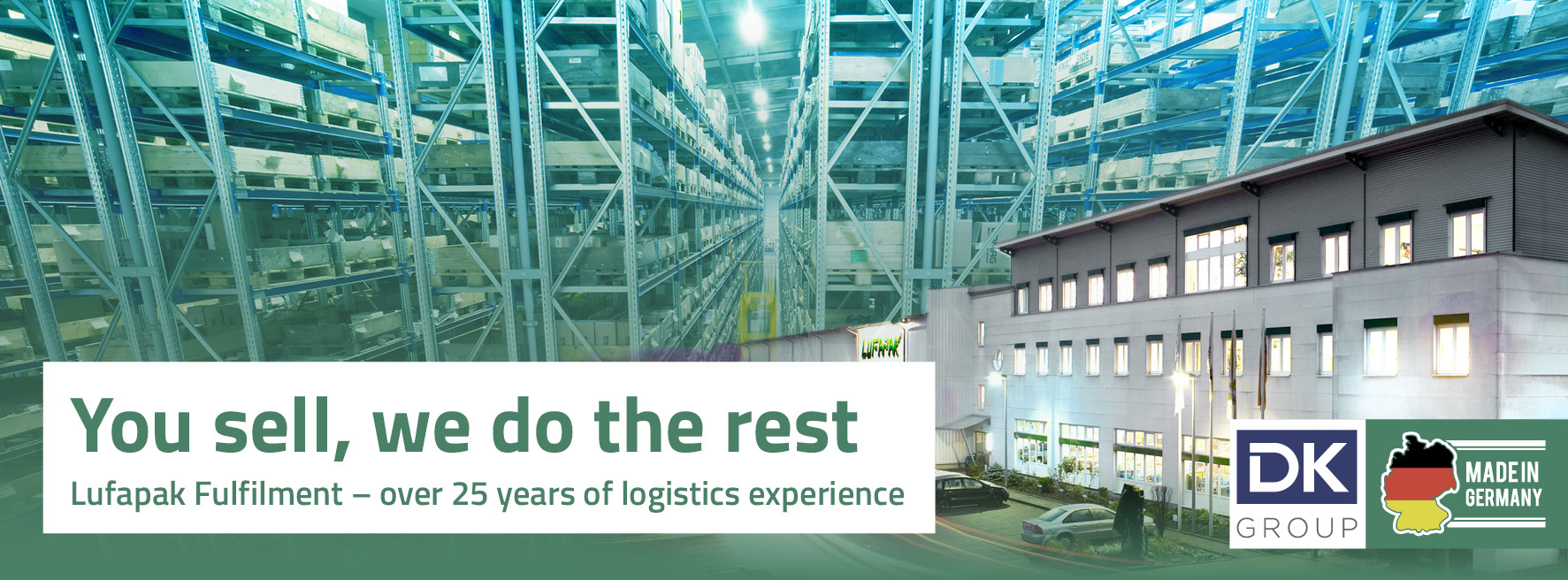sales@lufapak.de +49 2631/384-0 Contactform
Logistics
What is logistics? A simple definition
Logistics encompasses all processes necessary for the flow of goods, information and resources from their point of origin to the end user. A precise logistics definition describes it as the science of planning, controlling and optimising these flows. The term originally comes from the military sector, where it refers to the supply of everything necessary for the troops.
For companies, the importance of logistics means the coordinated handling of all transport, storage and transshipment processes, as well as the associated information and control processes. The term has been expanded in business practice to now also include aspects such as procurement, production and distribution.
For a better understanding, the logistics definition can be simply explained as ‘the right product, in the right quantity, at the right place, at the right time, in the right quality, at the right cost’. This principle illustrates the complexity and importance of logistical processes for functional economic systems.
As a cross-departmental function, logistics connects various company departments and ensures that they work together smoothly.
The economic importance of logistics
The importance of logistics for the economy can hardly be overestimated. As a key factor for competitiveness, it enables companies to reduce costs and at the same time increase customer service levels. About 8-10% of the gross domestic product is accounted for by logistics activities, which underlines the economic relevance of this sector.

For trading companies, logistics is a key success factor. Optimised supply chains reduce inventories, shorten delivery times and lower transport costs. The economic definition of logistics therefore emphasises the value-adding aspect: by bridging the spatial and temporal distances between production and consumption, logistics creates tangible added value.
Global procurement and sales markets have further increased the importance of logistics in recent decades. International flows of goods require sophisticated logistics systems to ensure efficiency despite complex supply chains. This is also reflected in the increasing demand for logistics real estate in strategically favourable locations.
In addition, the logistics industry itself is an important economic sector and employer, with millions of people worldwide working in transport, warehousing and coordination activities.
Core tasks of logistics in a corporate context
The tasks of logistics can be divided into several core areas. Transport and traffic logistics organise the physical flow of goods between different locations, taking into account costs, time and environmental factors. The focus here is on selecting the appropriate mode of transport and optimally planning transport chains.
Warehouse logistics encompasses the planning, management and control of all warehousing activities. These include incoming goods, picking, packing and shipping, as well as inventory optimisation measures. Modern warehousing systems use automated technologies to maximise efficiency and accuracy.
Production logistics coordinates the internal flow of materials and ensures that all production components are available at the right time. In this context, the logistics definition includes the control of internal material flows. Just-in-time concepts illustrate the close link between production and logistics processes.
Procurement logistics organises the supply of raw materials and supplies from external suppliers, while distribution logistics is responsible for the distribution of finished products to customers or dealers. Returns logistics, which efficiently handles returns and feeds them back into the material cycle, is also becoming increasingly important.
The 7 Rs of logistics: a basic principle of logistics
The basic principle of logistics is often described with the so-called ‘7 R rule’, which is considered a synonym for quality standards in logistics. This rule precisely defines the core aspects of successful logistical processes and provides a clear benchmark for logistics services. The seven Rs include: the right product, in the right quantity, in the right place, at the right time, in the right quality, at the right cost for the right customer.
The first R – the right product – refers to the error-free provision of the specified goods without confusion or wrong delivery. Identification systems such as barcodes or RFID tags support this principle. The second R, the right quantity, means delivering the exact quantity needed, with no over- or under-supply. Modern inventory management systems help to determine the precise quantity. The third R, the right place, requires delivery to the agreed destination, be it a goods receiving area, a production line or a customer site.
The fourth R, right time, is especially important for just-in-time concepts and requires precise delivery within a defined time frame. The fifth R, right quality, guarantees flawless goods that meet specifications and are free from damage or defects. Quality assurance systems continuously monitor this aspect. The sixth R, right cost, aims for economic efficiency in the entire logistics process, while the seventh R – right customer – ensures that each shipment reaches its intended recipient.
These basic principles illustrate the importance of logistics for smooth business processes and form the foundation of successful logistics work. Failure to meet any of these criteria results in inefficiencies, customer complaints or economic losses.
Job profiles and fields of work: What is logistics work?
The question ‘what is logistics work’ covers a wide range of activities and job profiles. From operational activities in warehousing and transport to analytical planning tasks in supply chain management, the industry offers a wide range of career opportunities. Classic job profiles include warehouse logisticians, freight forwarding clerks, professional drivers and dispatchers.
As logistical processes become more and more complex, the demands on skilled personnel also grow. University degrees in logistics and supply chain management qualify graduates for management positions, such as logistics manager or supply chain analyst. These specialists analyse the flow of goods, optimise processes and develop strategic concepts for ensuring security of supply.
Logistics work takes place in almost all sectors of the economy, but is particularly pronounced in trade, industry and service companies. Logistics service providers often take over complete processes for their customers – from warehousing and transport to customs clearance. The logistics definition of the economy therefore also includes the role of specialised service providers in the economic structure.
Digitalisation is fundamentally changing logistics jobs. New job profiles are emerging at the intersection of IT and logistics, such as logistics data analysts or automation specialists. This development underlines the growing importance of digital skills alongside traditional logistics expertise.
The strategic goals of logistics
The goals of logistics can be divided into economic, ecological and social dimensions. Economic goals include cost reduction, productivity increase and process optimisation. Through efficient transport planning, optimal warehouse utilisation and automated processes, companies can minimise their logistics costs while simultaneously increasing performance.
Increasing flexibility is also one of the core objectives. Logistics systems must be able to react to fluctuations in demand, market changes and disruptions in order to ensure security of supply. This requires resilient structures and alternative procurement channels. A precise logistics definition contributes to an understanding of these complex interrelationships.
Environmental goals are becoming increasingly important. Emission reduction, resource conservation and sustainable transport concepts characterise modern logistics strategies. Multimodal transport chains, which combine environmentally friendly modes of transport, reduce the ecological footprint.
The social dimension includes occupational safety, ergonomic workplace design and fair working conditions along the entire supply chain. A balanced system of objectives takes into account all three dimensions and considers potential conflicts of interest – for example, between economic efficiency and sustainability. The challenge is to balance these objectives in a dynamic market environment and to optimise them continuously.
Logistics 4.0: digitalisation and technological change
Digitalisation is fundamentally revolutionising the logistics industry. Under the term Logistics 4.0, the change to networked, data-driven processes is taking place, enabling greater efficiency and transparency. Intelligent transport and storage systems communicate with each other and independently optimise their processes. Sensor networks continuously collect real-time data on the flow of goods and enable precise forecasts.
Artificial intelligence and machine learning significantly improve route planning and demand forecasting. Algorithms identify optimal routes, taking into account numerous factors such as traffic and weather conditions and delivery priorities. As a result, the tasks of logistics are expanding to include complex data analysis and predictive decision-making. Predictive analytics enables predictive maintenance and minimises downtime of vehicles and equipment.
Robotics and automation are shaping modern warehouses. Driverless transport systems, picking robots and automatic sorting systems increase throughput and accuracy while reducing costs. These technologies relieve employees of physically demanding tasks and enable them to be deployed for more complex tasks.
Cloud platforms create the basis for collaborative logistics networks in which partners share and jointly optimise resources. This digital transformation is changing the logistical significance of the economic structure and opening up new business models, but it also requires significant investments in technology and employee training.
Logistics in a global context: international supply chains
International supply chains connect production and sales markets worldwide and require specialised logistics expertise. Global networking offers access to cost-effective production locations and new sales markets, but at the same time increases the complexity of logistics processes. Long transport routes, different legal frameworks and cultural differences pose particular challenges.
Customs clearance and foreign trade regulations characterise the international movement of goods. Logisticians must be familiar with customs tariffs, import regulations and trade agreements to ensure smooth border crossings. What is logistics work in this context? In addition to operational activities, it also includes extensive knowledge of international trade rules and their practical application. Specialised software supports the creation of the required documents and compliance with complex regulations.
Intercontinental transport chains combine various modes of transport. Sea freight dominates the global exchange of goods due to high capacities at comparatively low costs. Air freight, on the other hand, offers speed advantages for time-critical shipments. For optimal results, logistics experts coordinate these different transport modes in seamless intermodal chains.
Risk management is becoming increasingly important in global supply chains. Natural disasters, political unrest or pandemics can block individual supply routes. Multiple procurement sources, strategic buffers and alternative transport routes increase the resilience of international logistics networks and ensure supply despite unforeseen events.
Conclusion: the future of logistics
The future of logistics will be shaped by advancing digitalisation, increasing sustainability requirements and growing globalisation. Autonomous transport systems, blockchain technology for transparent supply chains and AI-supported forecasting models will fundamentally change the logistics sector. The future of logistics, simply explained, means more than just the movement of goods – it encompasses intelligent, data-driven processes for optimising complex supply networks.
For companies, this means growing demands on their logistical capabilities. Agility and adaptability will become key competencies in order to be able to react to dynamic market changes. The integration of real-time data enables forward-looking logistics control and proactive risk management.
At the same time, logistics systems must become more environmentally friendly. Circular economy, low-emission transport concepts and resource-saving packaging solutions characterise sustainable logistics strategies. The goals of logistics are expanding accordingly to include ecological and social components that must be reconciled with economic goals.
New business models are emerging at the interface between technology and logistics. Platform-based logistics solutions optimise the use of resources by intelligently matching transport capacities and demands. These developments underscore the central role of logistics for competitive economic systems and make it clear: logistics remains a dynamic field with enormous potential for innovation and value creation.
Contact us now and get advice

